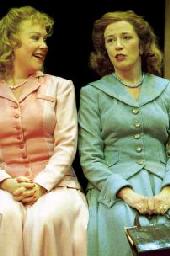SEARCH CurtainUp
REVIEWS
FEATURES
NEWS
Etcetera and
Short Term Listings
LISTINGS
Broadway
Off-Broadway
BOOKS and CDs
OTHER PLACES
Berkshires
London
LA/San Diego
Philadelphia
Elsewhere
QUOTES
On TKTS
LETTERS TO EDITOR
FILM
LINKS
MISCELANEOUS
Free Updates
Masthead
NYC Weather
 London Review
London Review
The Merry Wives of Windsor
by Brian Clover
|
You will know by my size I have a certain alacrity in sinking
--- Falstaff, on being dropped in the Thames |

Claire Carrie as Mistress Ford and Lucy Tregear as Mistress Page
(Photo: Manuel Harlan) |
So, various kinds of male absurdity are on display tonight. Fat old Sir John believes he's irresistible to women. Jealous husband Ford takes Sir John at his word. Smug husband Page thinks he is smarter than his wife. Dr Caius and Pastor Hugh forget their professional vows at the drop of an insult and are ready to duel to the death. Young Slender thinks himself a good catch for the Pages' daughter. They're wrong of course, but their smug self-satisfaction is all but invincible.
To underline this, director Rachel Kavanaugh sets her production in the late 1940's Britain of David Lean's Brief Encounter and the Ealing comedies, a Golden Age of social stability and, of course, male supremacy; the upheavals of war past, the challenges of the '60's yet to come. Women are property like land and houses; to be bought, traded or -- look out! -- stolen.
Perhaps Kavanaugh meant to use this setting as a critique of the play. The brilliant bare set and classic costumes - from Peter McKintosh - suggest the comedy is taking place in the never-never land of many British sit-coms, insulated from the real world. Couples fall out at noon, but make up by bedtime: no harm is done. This works us towards the point where the otherwise amiable Page icily tells suitor Fenton to stay away from his daughter: Fenton is black. British insularity is challenged . . . but common sense and good humour eventually prevail and no harm is done. Kavanaugh seems to be saying, "Should we really be enjoying this stuff at all?" Well . . . .
The play itself poses problems. At times the Merry Wives looks like an excuse for a collection of character routines -- there are many characters -- rather than a tightly plotted farce. One plot pivots on the mocking of anyone not English. This is always hilarious: at least it is in England. A second hinges on the humiliation of the randy Falstaff. A third uses the jealousy of Ford and the fourth concerns the wooing of Ann Page.
This is a lot to juggle and indeed, the pace of this production sags a little in the first half and could have used a little more cutting. There are wonderful set-piece comic performances from the cast but they tend to delay the action. The ensemble work is also sometimes a little stiff. However, things improve greatly in the second half and our enjoyment is only slightly marred by being told too often what is going to happen before it happens. (This is Shakespeare's fault: he got better.) You could quibble that this approach understates the darker elements of the Merry Wives. Ford's despair, rage and near-breakdown -- brilliantly portrayed by Tom Mannion, with more than a touch of Basil Fawlty -- nearly sink the play, like an elephant in a skiff. The revenge of the Wives (Lucy Tregear and Claire Carrie) verges on the sadistic. Think a little what Elizabethan hygiene must have been like and you realise Falstaff's imprisonment in a laundry basket was not the light-hearted pantomime punishment it appears. Later, the text calls for him to be beaten with a cudgel, not the comedy broom of this production; moreover, his assailant believes him to be a woman and his assault is generally approved. Falstaff's final punishment is also nastier than we are shown here: a genuine fear of the night and its terrors becomes a modern children's Halloween affair.
However, the physical comedy draws many laughs and, apart from the performances already cited, you will also enjoy Alison Fiske's "pre-Malaprop" Mistress Quickly and Greg Hicks' scene-stealing Frenchman Dr Caius, an uncanny combination of Cosmo Kramer and Jacques Tati. In all, an enjoyable night out in the company of the Royal Shakespeare Company and a rare chance to see an interesting play.
| The Merry Wives of Windsor
Written by William Shakespeare Directed by Rachel Kavanaugh With: David Killick, Adam Kay, Karl Morgan, Richard Corderey, Lindsey Fawcett, Ciaran McIntyre, Richard Copestake, Kieron Jecchinis, Simon Coates, Lucy Tregear, Hannah Young, David Jowett, Daniel Ciotkowski, Tom Mannion, Claire Carrie, Michael Gadiner, Patrick Romer, Greg Hicks, James O'Donnell, Alison Fiske, Chuk Iwuji, Kate Best Designer: Peter McKintosh Season Stage designed by Peter McKintosh and Ti Green Lighting Designer: Hartley TA Kemp Sound: Gregory Clarke Music: Terry Davies Movement: Scarlett Mackmin Musical Director: Richard Brown/James Dodgson A Royal Shakespeare Company production Running time: Two hours 40 minutes with one interval . Box Office: 020 7928 7616 Booking to 23rd August 2003 in rep with Coriolanus Website: www.rsc.org.uk Reviewed by Brian Clover based on 18th June 2003 Performance at the Old Vic, Waterloo Road, London SE1 (Tube Station: Waterloo) |

Mendes at the Donmar
Our Review

Peter Ackroyd's History of London: The Biography

London Sketchbook

Somewhere For Me, a Biography of Richard Rodgers

At This Theater

Ridiculous!The Theatrical Life & Times of Charles Ludlam

The New York Times Book of Broadway: On the Aisle for the Unforgettable Plays of the Last Century

6, 500 Comparative Phrases including 800 Shakespearean Metaphors by CurtainUp's editor.
Click image to buy.
Go here for details and larger image.



